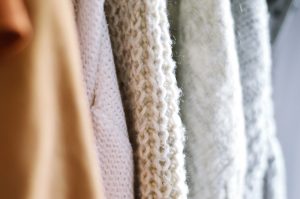Usually, fabric softener comes in two different forms. The liquid form, used in a washing machine, or coated sheets used in the dryer.
Fabric softeners are usually used to prevent static, add a scent, help with wrinkles, and make the material much softener. How does this work? Fabric softener covers the fabric in a lubricating thin-film. This prevents the wrinkling of fabrics by making the fabric slippery, which leads to reducing the friction. Additionally, they are scented and designed so that the scent remains in the fabric.
Fabric softeners became very popular in the mid-1900s because all detergents, dyes, dryers were harsh on clothes making them scratchy and rough. Although today’s washing machines, detergents, dryers are much better than they were before, we are still used to using fabric softeners. We don’t think twice about it.
What is a Good One?
If you are looking for your clothes to be comfortable, static-free, and fresh you need the best fabric softener every time you are doing your laundry.

Fabric softeners are usually used to prevent static, add a scent, help with wrinkles, and make the material much softener.
Here we are not going to talk about the best brands but give you some guidelines on what a good fabric softener is.
Liquid fabric softener is the most expensive option per load, but it is the most effective one as well since it will eliminate odors and soften your clothes. Although it might seem counter-intuitive since it’s being used in the washing machine, rather than dryer, liquid fabric softeners will reduce the amount of static in your clothing. Additionally, liquid fabric softeners have a lot of alternative uses such as removing hard-water stains or keeping paintbrushes pliable.
The dryer sheets even the most expensive ones are usually more affordable than the liquid fabric softener. It will do the job of fighting static, leaving your clothes smelling nice and feeling soft. Plus, if you are cleaning your clothes at a laundromat, it’s much easier to bring a few dryer sheets than liquid fabric softener.
The third option is the dryer balls. These are a more eco-friendly choice. They are typically made from wool or heat-resistant BPA-free plastic. Dryer balls are good for the environment, inexpensive, effective at fighting statics, help clothes dry faster but sometimes they leave clothes scratchier than sheets and liquids. Also, they don’t eliminate the odor.
How to Use Softener?
If you are using dryer sheets, it’s pretty easy. Once you load your laundry into the dryer, add a couple of dryer sheets.
For liquid fabric softener, the measurement is an important part. You don’t want to add too much but you don’t want to add too little either. The best thing to do is to follow the instructions on the box when it comes to how many cups of fabric softener you should use.
The dryer ball needs room in a dryer to do its job so it should be used only on small or medium-sized loads. Usually, three dryer balls are enough per load. The good thing about wool dryers is that they can typically last for more than 1000 loads and somewhere between two and five years of use.
What Does Fabric Softener Do?
Some believe fabric softener makes little difference in the result. However, fabric softeners are intended to keep your laundry soft to touch, add scent, and reduce wrinkles. When used regularly, fabric softeners can make your clothes last longer. It accomplishes all of this by using lubricating chemicals that act on the fibers. Early softeners used oils while today’s modern brands use synthetic chemicals such as polydimethylsiloxane or other different silicone derivates. You can think about fabric softeners as a moisturizer for your laundry.
Keep in mind that some fabric softeners contain chemicals that can irritate your skin. If you use dryer sheets, the material can also clog the dryer filter. Dyer balls are the most convenient ones, but they can leave your clothes feeling stiff.
Choosing the right fabric softener depends on what kind of clothes you are washing. Fabric softeners can clog the fabric of athletic wear and they are not good for towels where they can reduce their absorbency. Also, it’s not advisable to use fabric softener on nylon, polyester, and infant clothing.




